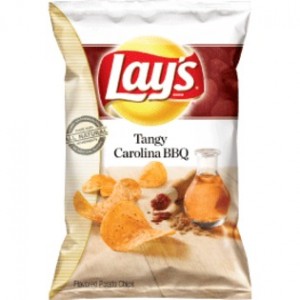With the spike in living standard over the past decade, consumers nowadays are increasingly concerned about what they consume, from household cleaning products to food. They are looking for greener alternatives for both the environment and themselves. When it comes to healthy consumption, consumers always have the natural misconception that being natural is better and of greater nutritional values. With this ever amplifying social trend towards healthy living in place, companies like Frito-Lay and Seventh Generation, are tapping into such mindset by launching a wide range of “healthy” products, most of which feature their natural ingredients.
Lay’s Tangy Carolina Potato Chips is a good case in point. Its marketers pull the wool over public’s eyes and pass the cancer-causing potato chips off as a healthy alternative by reinforcing the fact that they are made with 100% natural ingredients. The marketers also feature in their advertisement the health-oriented Food Scientist Jaime Reeves making chips out of fresh vegetables for her families. However, the brutal truth is that potato chips are, in spite of all the natural ingredients, carbohydrate-rich potatoes cooked at high temperature with acrylamide as a byproduct. Health Canada has listed potato chips as products with highest concentration of acrylamide. Several studies have suggested a positive correlation between acrylamide intake and the increased risk of cancer.
[youtube=https://www.youtube.com/watch?v=b2093wkKQEg]
Lay’s ethics has been called into question, raising the concern that featuring 100% natural ingredients in the advertisement is simply misleading and exploiting consumers’ misconception on the concept of “natural”. Such advertisement targets the segments of market where people are addicted to chips and people who like chips but stay away from them because of their negative health effects. These “natural” chips give them an easy way out and justify their behavior of increasing potato chips consumption. As consumers, we really need to be skeptical about the 100%-natural label as “natural” can be of different meanings to us and to companies, who play with its definition to achieve their sales growth instead of assuming their corporate responsibilities.

That Frito-Lay Chef commercial is extremely misleading. If I hadn’t read this blog post, I would have believed that they were actually a healthy alternative. Reading this post, I realized that Lays had successfully mislead me. Having a chef in a pristine kitchen cutting up fresh vegetables really made me think that the chips are just as healthy if I were to make them myself at home which is quite the contrary.
It is so true! A lot marketers use those words to lead us into the gray area, and made it hard for us to tell from right to wrong.
It reminds me that the most of the low-fat food products we see everyday in the market, also have the same issue. The advertiser will highlight the “zero-calorie” at the front of the product’s package to attract the attention of the consumers who care about their bodys and healths. However, the trick is: if you turn to the back of the package, among the long list of ingredients, some secrets are hiding there! The majority of these products will be “high salinity” to compensate the lost taste due to “low-fat”, which will cause series heart troubles.
Oh! The World! We have to be careful all the time…